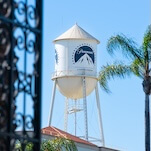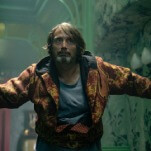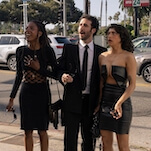On the evening of August 24, 1944, Swedish diplomat Raoul Nordling (André Dussollier) uses a secret passageway to sneak into the office of German General Von Choltitz (Niels Arestrup), the nominal governor of Paris, in order to both eavesdrop on the man’s plans and, more important still, to confront him in an effort to stop the Nazi commander from blowing up Paris. Adapted from Cyril Gely’s play, Diplomacy charts their night together, most of it spent in the general’s hotel room, where they engage in a lengthy debate about the practical and moral consequences of Hitler’s order, which was apparently motivated by the Führer’s jealous desire to not let Paris stand in the wake of Berlin’s destruction. It’s a stagy setup whose theatrical roots are always front and center, yet it’s one that’s handled with aplomb by director Volker Schlöndorff (The Tin Drum), whose latest has enough visual panache to compensate for the static, conversational nature of the work.
Though his compositions are sometimes a bit heavy-handed in expressing the moment-to-moment dynamics of Nordling and Choltitz’s relationship (especially when characters are shunned to corners, or the deep recesses, of the frame), his generally fluid direction keeps the action brisk. That’s no small feat, given that—due to historical realities, and the fact that the script (by Schlöndorff and Gely) fails to drum up adequate intrigue about how Nordling will avert such disaster—the fate of Paris never truly feels in doubt. Nordling and Choltitz’s contentious back and forths bring to the fore questions of sacrifice, duty, and military and ethical responsibilities. However, the out-and-out heinousness of the Nazis’ plan, which involves blowing up Paris and its 1.5 million inhabitants for no strategic purpose, means that Choltitz’s arguments come off first like blind-obedience craziness, and then like pitiful excuses, thereby skewing the drama so heavily in Nordling’s favor that any intellectual tension is negated.
If Diplomacy falls short of pulse-racing, and its efforts to cast its story as relevant to contemporary issues (via repeated use of the terms “terrorist” and “martyr”) feel strained, Schlöndorff’s film still proves a mildly gripping history lesson and portrait of the power of negotiation. That’s in large part thanks to the consistently riveting sight of two skilled actors engaging in a battle of wits, with Dussollier conveying an alternately anxious and resolved determination to change his adversary’s mind (or at least delay his decision until American forces reach the city), and Arestrup exuding a weary resignation about his country’s (and his own) fate that’s amplified by his concerns about the welfare of his family. Their material may not be great, but they nonetheless prove a formidable and consistently compelling pair.









































